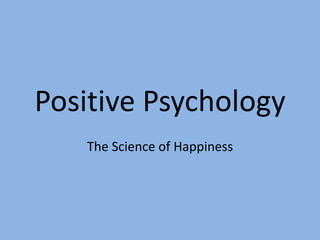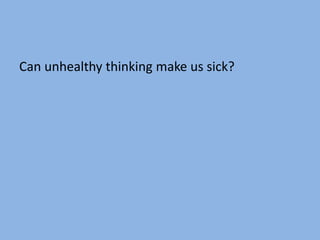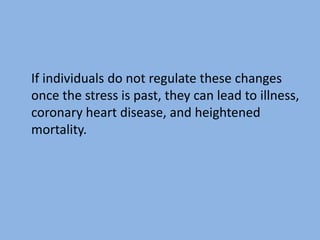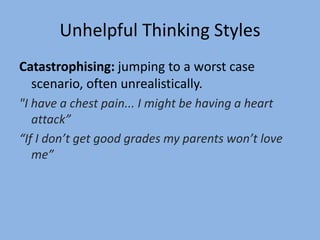Year 10 psychology second semester
- 1. Psychology
- 2. What is Psychology? What is the purpose of studying Psychology? Who can be helped by a Psychologist?
- 3. What is Psychology? • Psychology is the study of the brain and behaviour
- 4. Positive Psychology The Science of Happiness
- 5. Groups of 3 to 4. Time: 15 minutes Answer the following questions 1. What is happiness? 2. Is happiness necessary? 3. Can you influence how happy you are? 4. List five things that would make you happier.
- 6. What makes a person happy? • Genetics? • Life circumstances? • Personality Traits? • Money? • Things? • Family? • Friends?
- 7. What makes a person happy? • Discuss in groups. Rank the list in order in the most important to the least important factors that influence happiness. • 5 minutes • Genetics? • Life circumstances? • Personality Traits? • Money? • Things? • Family? • Friends?
- 8. Can unhealthy thinking make us sick?
- 9. When people experience stress, they show increased heart rate, higher blood sugar, immune suppression, and other adaptations optimized for immediate action.
- 10. If individuals do not regulate these changes once the stress is past, they can lead to illness, coronary heart disease, and heightened mortality.
- 11. Contentment
- 12. What makes you happy?
- 13. Are you happy with your lot in life?
- 17. Are you happy with your lot in life?
- 23. How rich are you on a world scale? The average male wage in Australia is $66,664 per annum. (USD$ 57,107 ) The average female wage (ordinary time earnings) in Australia is $55,037 per annum. ((USD$ 47,150) Guess where this stands in against global standards – write down your guess. Eg top 50%, top 20%.
- 24. Go to http://www.globalrichlist.com/ Use these figures to determine how rich the average Australian is on a global scale.
- 25. The Global Rich List calculations are based on figures from the World Bank Development Research Group. Percentage of world population Percentage of world income Yearly individual income Daily individual income Bottom 10 percent 0.8 $400 $1,10 Bottom 20 percent 2.0 $500 $1,37 Bottom 50 percent 8.5 $850 $2,33 Bottom 75 percent 22.3 $1,487 $4,07 Bottom 85 percent 37.1 $2,182 $5,98 Top 10 percent 50.8 $25,400 $69,59 Top 5 percent 33.7 $33,700 $92,33 Top 1 percent 9.5 $47,500 $130,14
- 26. It is human nature to compare our lives with the lives of others. Question: How do magazines, television and advertising promote dissatisfaction in our lives?
- 27. Have you ever been: Homeless? Hungry for more than a day? Thirsty with no clean water to drink? Very ill without medical treatment? Held against your will? Enslaved? It is important to maintain perspective that we have the amongst the very best living standards in the world.
- 28. GRATITUDE
- 29. Gratitude Gratitude is one of the ways we can enrich our lives to make us happier. There are many people that help us on a daily basis, siblings, parents, coaches, teachers, neighbours, friends. Your task is to write a letter of gratitude to someone significant in your life.
- 30. • Write a gratitude letter to the person you pick, expressing your gratitude and why you are grateful in specific and concrete terms. If at all possible, deliver it personally and ask the person to read the letter in your presence. If personal delivery is not possible, mail, fax, or email the letter and follow up with a phone call.
- 31. 1. Write letter, let the person read it in your presence. 2. Write a reflection – describe briefly what the letter is about, how the person responded and how it made you feel
- 32. • In research studies, both initiator and recipient of the gratitude letter report positive outcomes. Those who are habitually grateful are found in studies to be happier than those who are not. Use your gratitude letter to reinforce the benefit of continual gratitude expression.
- 33. Personal Character Strengths and Virtues Six main virtues are considered good by the vast majority of cultures and throughout history and that these traits lead to increased happiness when practiced.
- 34. The organization of these virtues and strengths is as follows: 1. Wisdom and Knowledge 2. Courage 3. Humanity 4. Justice 5. Temperance 6. Transcendence Go to “authentic happiness” site and do the brief strength test. You must first make an account.
- 36. Unhelpful Thinking Styles Black and white thinking: thinking in an all- or- nothing style, extreme thinking. Words like always and never come into most of these thoughts. “I will never get all this work done” “I always end up having a bad time”
- 37. Unhelpful Thinking Styles Mental filter: when you pick out a negative detail and focus on that exclusively and overlooking anything positive. For example you might dwell on one negative comment from some feedback and forget about all the other positive comments.
- 38. Unhelpful Thinking Styles Mind Reading : Guessing at what others are thinking, usually negative. “They must think I am a real idiot” Or “The teacher thinks I am stupid”
- 39. Unhelpful Thinking Styles Predictive Thinking: Predicting a negative future without waiting to see what will happen. “I bet when I get up in front of the class I won’t be able to speak and I will fail my oral presentation.” "I won't be able to cope with year 12.“
- 40. Unhelpful Thinking Styles Personalisation: taking total responsibility for external events occurring, ignoring all other factors. “If I had gone to my friends place she woouldn’t have been in that car accident”
- 41. Unhelpful Thinking Styles Catastrophising: jumping to a worst case scenario, often unrealistically. "I have a chest pain... I might be having a heart attack” “If I don’t get good grades my parents won’t love me”
- 42. Unhelpful Thinking Styles Labelling: globally putting yourself (or others down). For example you might make a mistake and think "I'm a failure". You cannot be a complete failure in every aspect of your life therefore it is irrational to call yourself an failure. Alternative: I have failed at this task but there are so many other things I can do. I need to move on and learn from this mistake.
- 43. Unhelpful Thinking Styles Should statements: having a fixed view on what you think you (or others) should be doing or behaving. Also includes: ‘musts'; ‘ought to's'; and have tos'. For example "I should have gone to that lecture" Alternative: It would have been beneficial to have gone to that lecture- I'll have to go to the next one.
- 44. Diary of a negative thinker Read the negative thinker’s diary. Underline and identify unhelpful thinking styles. Rewrite the diary entries to be more positive. It is important to be realistic.
- 45. KINDNESS
- 46. Questions for Discussion 1) What is your definition of kindness? 2) Have you ever felt disappointed or cheated because you did something nice for another person,but he or she did not return the favour? 3) If you expect to get something back, are you then performing a kind act or are you really trading favours for favours? 4)Has anyone ever done something for you anonymously, without expecting something in return?
- 47. Random Acts of Kindness Get into groups of 4. Brainstorm a list of as many nice things that you could do for others. It may be at home or at school or elsewhere.














































